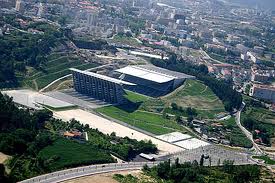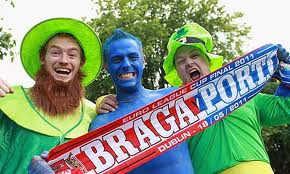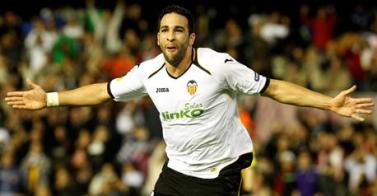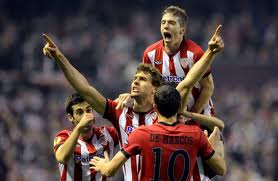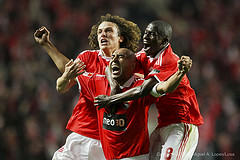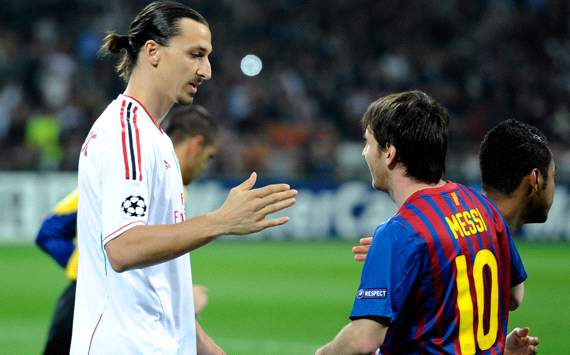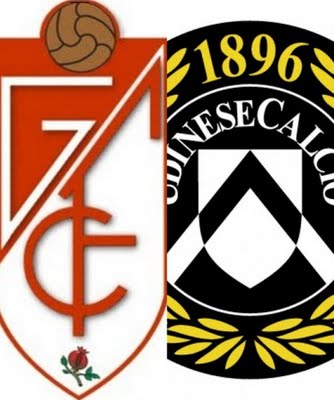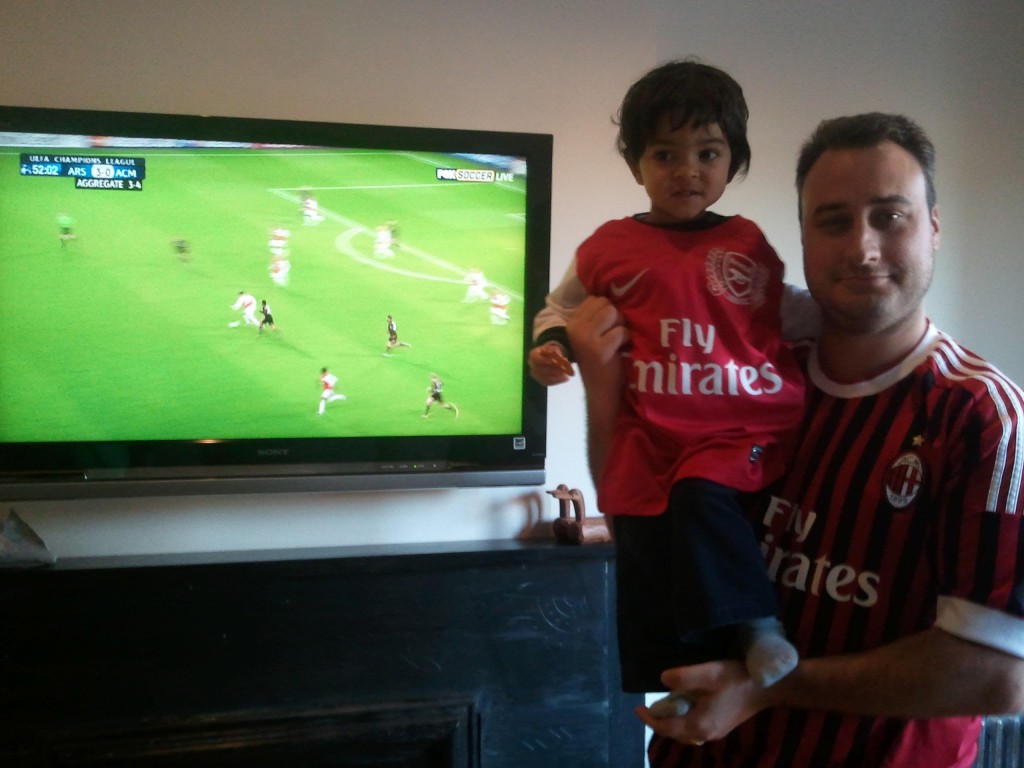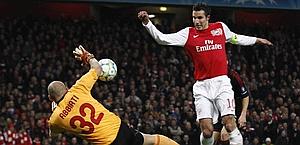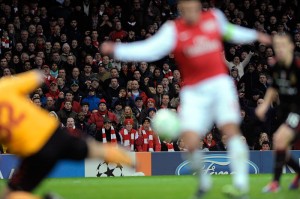There’s a full slate of mid-week La Liga fixtures this week–two matches today and the rest of La Liga playing tomorrow. One of today’s matches has Barcelona hosting Granada. It shouldn’t really be much of a contest–Barcelona hasn’t lost at home all season. Perhaps the only reason to watch is that there’s a good chance Lionel Messi will pull even with or even surpass César as Barcelona’s all-time leading scorer.
But it’s also a chance to take a look at Granada’s unique arrangement with Italian club Udinese. Granada essentially serves as a development squad for Udinese, with a large number of Granada’s squad over the past few years arriving on loan from Udinese. From AFootballReport piece on how this came about:
In 2009, Granada CF was a club in crisis, both competitively and financially. The club was on the brink of disappearing, despite a rich 80 year history. Gino Pozzo saw a money-making opportunity that would double as a way to develop Udinese talent, and in July 2009, the two clubs signed a partnership agreement so the majority of Granada’s squad would become Udinese-owned, while the Italian club could also send over its reserves and youngsters.
So what are the benefits for Gino Pozzo and Udinese Calcio? Well, the strategy is to use the exposure Granada gets in the Spanish league to showcase Udinese-owned talent that will, in turn, gain value in the transfer market. With Pozzo’s commitment to investing, Granada only seems likely to improve in the future. And Pozzo’s “buy cheap, gain exposure, sell high” philosophy is already working. Just imagine the possibilities for profit if Granada gets into the top flight in Spain.
The agreement came about via a Spanish football wheeler and dealer named Quique Pina, who took over as Granada’s president in 2009, in that time of crisis. Although he had operated in Spain, he happened to be working for an Italian club at the time. From a Sid Lowe SI column about Granada from last fall:
Pina was a former player (with Mérida), agent, and the owner of the short-lived Ciudad de Murcia — a club that was founded in 1999 and disappeared in 2007 when Pina effectively sold its Second Division place to the owner of Granada 74, which in turn, disappeared in 2009. At the time, Pena was working for Udinese in Italy. When Pina was asked to take over at Granada, the Pozzo family who own Udinese, allowed him to combine both jobs with their blessing. In fact, they supported Pina — and they supported his “other” new club. Really supported.
How did the Pozzo family and Udinese support Pina’s new venture in the south of Spain? By essentially providing him with the fruits of their extensive and much-admired scouting system. From a column in The Independent last summer, when Alexis Sanchez was the biggest transfer target in Europe, headlined “Super Sanchez is the latest big success story of little Udinese’s scouting system“:
Udine is a city of 100,000 in the misty terrain between Venice and the Alps. With crowds at the Stadio Friuli typically no more than 17,000, annual gate receipts are equivalent to those trousered by Manchester United after a single match at Old Trafford. According to the erudite football blog, Swiss Ramble, Udinese’s 2009-10 wage bill of €31m compared with €230m and €172m at Internazionale and Milan respectively. Only the club’s ageless talisman, Di Natale, has an annual salary exceeding €1m; Sanchez himself has apparently been taking home around €700,000. Internazionale, Milan and Juventus, meanwhile, all enjoyed annual revenues of over €200m. At €41m, Udinese did not match a single Premier League club. Income from television accounted for €26m; Internazionale’s was €138m.
[…]
When Giampaolo Pozzo bought Udinese, 25 years ago, the club was still prey to the maddening, odious debilities that have so retarded the Italian game. A betting scandal earned a points deduction, and relegation. But Pozzo devised a solution that has now secured 16 consecutive seasons in Serie A, and regular European competition.
Udinese built up a network of 50 scouts around the world, concentrated primarily in South America and Africa. They focused especially on youngsters from second-tier nations, and duly found Sanchez as a 16-year-old in Chile. He cost just €2m, but his sale this summer will merely consummate a policy that has already yielded a transfer surplus of €112m over the past decade.
Stars to have used Udinese as a stepping stone include David Pizarro, Asamoah Gyan, Vincenzo Iaquinta, Sulley Muntari, Andrea Dossena, Fabio Quagliarella and Gaetano D’Agostino. Unlike so many clubs with a reputation for grooming young talent, however, Udinese have consolidated their status to the extent that they can now provide Champions League football themselves.
Indeed, although Udinese fell to Arsenal in the qualifying stage and failed to make it to the Champions League group stage, they’ve remarkably repeated their domestic success of last season and are poised to get another shot at European competition. They current sit 4th in Serie A, tied with Napoli (and that only thanks to two late goals last Sunday by Edinson Cavani that salvaged a draw for Napoli in Udine)–despite selling off not only Alexis Sanchez to Barcelona, but Swiss-Turkish midfielder Gökhan Inler to Napoli and Colombian defender Cristian Zapata to Villareal.
Swiss Ramble’s long piece on “Udinese Selling Their Way to the Top“, also from last summer following their impressive performance in Serie A, mentions the Granada component of their business plan:
Udinese have bolstered their strategy by forming a partnership with Granada, a club playing in the Spanish second division, where they loan youngsters that need playing time, such as the Ghanaian Jonathan Mensah. Given the Friuli club’s connections with the South American market, it is no coincidence that they opted for a club in a Spanish speaking country to park their players. In total, Granada currently have an amazing 14 players on loan from Udinese.
In fact, one of the logical results of Udinese’s approach is that they end up having an extremely large squad, so they absolutely need to loan out a vast number of players every season (earning them €3.6 million in 2010). Including the players at Granada, I make the current total 63, though I may well have lost count. This is the sort of “wheeler dealing” that makes Harry Redknapp look like a rank amateur.
That was last season, as Granada fought their way to promotion out of Segunda Division (a fuller account of that promotion, and in fact the story of their promotion from even lower tiers of Spanish football, can be found on yet another treatment of the Pozzo-Pina/Udinese-Granada story, titled “Granada’s Italian job“, on In Bed With Maradona. Another account from the Spanish press, in Madrid-based sports daily AS is headlined “Pina y Pozzo: un tándem para reflotar equipos en crisis“)
This season, the number of players on Granada’s current squad (included below) on loan from Udinese is apparently down to five. But there are six additional players on loan from other clubs, including three from Benfica, another club that Pina has strong ties with. Again from Sid Lowe:
In total, 12 of Granada’s first team squad [last season] were Udinese players. It was good for the Italians because their squad members got playing time, the chance to develop and gain first team experience, while keeping them in the shop window for potential buyers; it was good for Granada because it helped them clinch a top division place at last — and on the cheap.
The relationship has continued. Of those in this year’s squad, Allan Nyom, Odion Ighalo, Jaime Romero, Benítez, Geijo and Diego Mainz are all on loan from Udinese in one capacity or another. Guilherme Siqueira has been signed from them. Meanwhile Pena’s relationship with Benfica has facilitated them bringing in four others from Portugal, three on loan and one on a free transfer. And at the other end of the scale, nine players have been loaned out to Cádiz. Where Pena is employed as the sporting director.
For the details, see Granada’s squad list below. But to bring this back around to today’s match, we quote the opener to that IBWM piece for a nice bit of historical resonance:
October 28th 1973; quite the memorable date in Spanish football history. A young, straggly but immensely gifted Dutchman by the name of Johan Cruyff made his league debut for FC Barcelona, and the effect he’d have on football from that point on, not just in Spain, is one that still shapes the game today. This story, however, is not about the number 14 – it’s about the number 35. Barça’s opponents that day were Granada CF, a team who have spent 35 years away from the Spanish top flight…until now.
Granada’s squad list as of today (according to Wikipedia):
